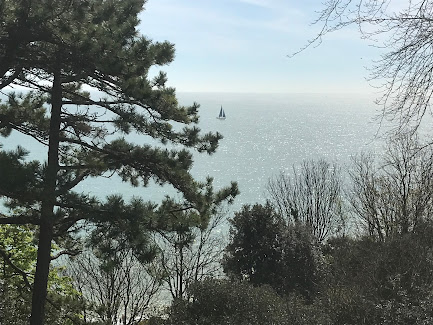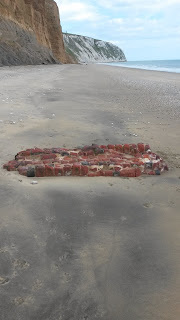robinson
I took this photo a couple of weeks ago, while I was walking on the seafront. It was a sunny Easter Day, the sea was calm, and that blue sailed boat was coasting along lazily, tacking parallel with the shore.
I'm really pleased with the picture, the outlook I mean. There is something tropical about the sea when it's viewed through trees and shrubs, it's as if I'm on a desert island watching the boat warily - is it rescue, or is it peril?
The whole idea puts me immediately, and firmly, in Robinson Crusoe territory. The 'romance' of being stranded on an island, living on my wits, eating coconut and herring, sleeping in a hammock, wearing a grass skirt (that's got to be itchy, right?). And then....and then one day I spot a footprint in the sand. I'm not alone.
I've never actually read the book, so all of my experience of the story comes from the 1964 TV version, that had the most glorious theme tune, and a handsome Crusoe. It was escapist kids television of the highest order, but I guess most kids TV is escapist because kids have the most extraordinary imaginations. The show was dubbed into English, from French I think, but that wasn't uncommon in itself on television at the time when children's programming was bought widely from across Europe and then dubbed into English. Follow this link if you want a trip down memory lane, or just an aural treat Robinson Crusoe theme
The novel itself is oft credited with being the first novel in the English language, and was written just over 303 years ago by Daniel Defoe. It was a runaway best seller; this from Wikipedia sums up the scale of its success "By the end of the nineteenth century, no book in the history of Western literature had more editions, spin-offs, and translations (even into languages such as Inuktitut, Coptic, and Maltese) than Robinson Crusoe, with more than 700 such alternative versions."
So the book was hugely popular, and a product of its time. It's rightly seen as problematic now. Crusoe was actually aboard a ship that was bound for Africa to steal people into slavery. That footprint he finds in the sand belongs to an escaped prisoner (brought ashore by cannibals to be killed and eaten). He names the prisoner Friday, and never mind that he might have had a name already, who is then often referred to as Man Friday, because that was the day of the week on which he was found (though how Crusoe had managed to keep track of the days of the week after having been marooned on that island for decades is anyone's guess). Crusoe teaches Friday English. The first word he teaches him is Master. Then he converts Friday to Christianity.
There is far more to the story than I've outlined here. Crusoe has quite a few adventures at sea in the early part of the novel, including being captured and kept as a slave himself, even before the fateful shipwreck occurs. And after Crusoe and Friday escape their desert island, located off the coat of Venezuela, they spend time travelling together in England, Portugal, Spain and France. I think it's probably safe to say that Robinson Crusoe is a story that many people would say they know, without really knowing the half of it. I certainly include myself in that number.
Photo is the author's own



Comments
Post a Comment